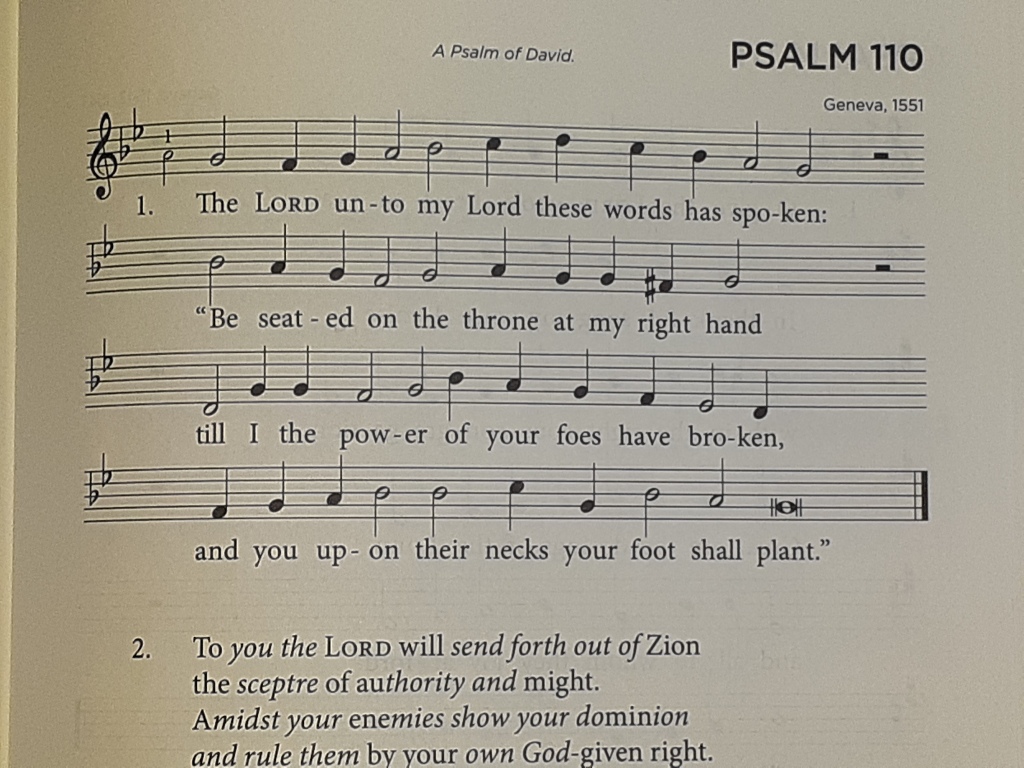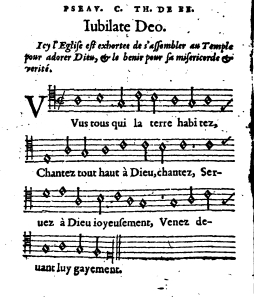Over the last while, a couple of classes (plural of ‘classis’) in the Canadian Reformed Churches have adopted overtures seeking to make a change to the CanRC Church Order. They want to add a new line to article 55: “The 150 Psalms shall have the principal place in the singing of the churches.” That wording is exactly the same as what the United Reformed Churches have in article 39 of their Church Order.
In principle I agree completely with this proposed change. In Aiming to Please, I have an entire chapter dedicated to the topic of Psalm-singing. In the final chapter, I mention “Prioritized Psalm-Singing” as one of the distinctives of Reformed worship.
However, there’s one question I didn’t answer in that regard. It’s a question I’ve been pondering lately in relation to the proposed changes to the CanRC Church Order: what does it look like to have the Psalms in “the principal place in the singing of the churches”?
One could take a simplistic approach to this question. If, in a given worship service, there are more hymns than psalms in the order of worship, then the Psalms are not being prioritized. Take this example of a recent order of worship:
- Hymn 79
- Psalm 75:1-3 (after the law)
- Psalm 47
- Hymn 69
- Hymn 81
So, there are three hymns, but only two psalms. According to this reasoning, the Psalms are not being prioritized. It’s simple math: three is greater than two. But what about this order of worship?
- Psalm 100:1,2
- Psalm 51:1 (after the law)
- Psalm 85:3
- Hymn 67
- Psalm 146:1,2
That would seem to be better. After all, now we have four psalms and one hymn. Four is much greater than one. But is it really that simple?
Two factors are being neglected with that kind of an approach. One is that it shouldn’t just be about the number of individual psalms that appear in the order of worship. We also have to account for how much of the psalm is being sung. In the second order of worship above, we don’t sing any psalm in its entirety. Instead, the pastor has just selected a few stanzas, even when with Psalm 100 it’s no burden to sing the entire piece. This is a common practice in our churches. So you could have a scenario where you have four psalms and one hymn in the order of worship, but you actually end up doing more hymn-singing than psalm-singing because only small portions of the psalms are being used.
The other factor being neglected is the relation of the order of worship to the sermon. A well-crafted order of worship is going to reflect the theme of the passage being exposited. In some instances, it then makes more liturgical sense to have certain hymns than the psalms. To use the first order of worship mentioned above, the text of the sermon was John 12:1-8 and the theme was: The Lamb is worthy to receive all our honour. Where do you find a psalm which explicitly speaks in those terms? “Lamb/lambs” is mentioned twice in the Psalms, both times in Psalm 114, and both times used poetically for hills skipping. But there’s no explicit reference in the Psalter to the Messiah as the Lamb of God. However, in our Book of Praise, we do have Hymn 69, which is based on Revelation 7:13-15 and 5:9-10. That hymn explicitly says, “Worthy the Lamb, for sinners slain…” There are some worship services where, in relation to the sermon and the passage it’s based upon, a greater number of hymns can better serve the glory of God.
As another example of that, think about “Days of Commemoration.” When we celebrate Christ’s incarnation, it is liturgically odd to sing a preponderance of Psalms, particularly since there aren’t any explicitly related to this event. Christ’s incarnation is one of the greatest events in history – and yet we’re just barely permitted to mention it in song? On this occasion, it’s more suitable to sing a selection of the appropriate hymns – and perhaps one or two psalms. To do otherwise gives the impression of slavish and simplistic adherence to a rule for the sake of a rule.
So what does it look like to have prioritized Psalm-singing? We have to think big-picture. We ought to think beyond the number of psalms and hymns in a given order of worship. A better metric would be to look not only at the number of psalms sung over a longer period (like a year), but also how much of these psalms are being sung. Another important metric might be the number of different psalms being sung – in its worship is the congregation singing the full range of God’s revelation in the Psalter? Furthermore, when comparing psalms and hymns, we also have to remember that not all hymns are the same. Some hymns are based on the Psalms – in the CanRC/FRCA Books of Praise, for example, Hymn 54 is based on Psalm 90 and Hymn 46 is based on Psalm 72:8-19. More than a few hymns are directly based on other specific passages of Scripture – as just one example, Hymn 36 is based on 1 Peter 1:3-5. Surely more weight has to be given to these hymns based on the Psalms and other passages of Scripture.
I love and treasure the Psalms. I’m thankful to be in a Reformed church that fosters that positive attitude towards these songs. Nevertheless, it’s important to be mindful of the tendency for churches to drift away from God’s covenant song-book. That’s why I’m thankful for these proposals in the CanRC and why I’d support a similar move here in the Free Reformed Churches of Australia.




